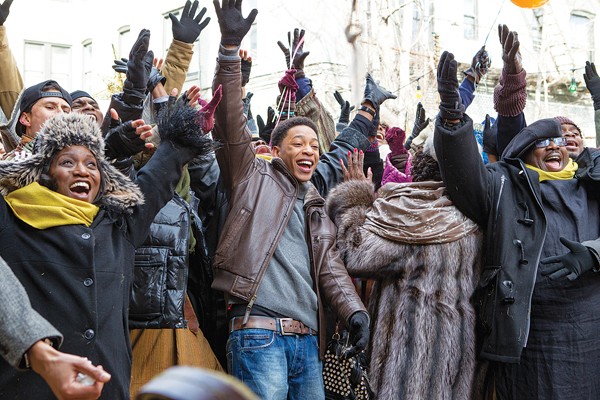
Philomena
Philomena
By Chris McCoy
Philomena is a film about different worlds colliding: the old world of conservative, Catholic Ireland collides with the sexually liberated 21st century; British media and political elites collide with the working class; and England collides with America — or at least its concept of “America.”
At the center of these collisions is Philomena Lee, played in this true story by Judi Dench. Philomena is a retired nurse, pushing 70 years old with a modest pension, a beautiful adult daughter, and a painful secret. In the early 1950s, when she was a naive, 18-year-old, Catholic girl from Ireland, she had a one-night fling at a carnival with a handsome young man and wound up pregnant. But post-war Ireland was not a good place to be a pregnant teenager, so her father placed her in the local convent home for unwed mothers. After almost dying in a horrific breech birth, which the nuns believed was her punishment for sexual immorality, Philomena was expected to work for the convent in virtual slavery for four years until the 100 pounds the sisters had supposedly spent on the health care and room and board for her and her apple-cheeked son, Anthony (played at various ages by Tadhg Bowen, Harrison D’Ampney, and Sean Mahon). But, before the four years are up, Anthony is adopted by a mysterious but clearly very rich couple and taken away from Philomena, never to be seen again. Believing she was atoning for a mortal sin, Philomena tells no one about her loss and goes on with a normal life until, on what would have been Anthony’s 50th birthday, she decides to set out to find her long-lost son.
Enter Martin Sixsmith (Steve Coogan, who also co-writes), an Oxford-educated, BBC White House correspondent turned spin doctor for Tony Blair. After being sacked from his political job after a public scandal, he’s depressed and trying to rebuild his career when he finds out about Philomena’s quest at the same posh cocktail party where he meets a tabloid editor named Jane (Anna Maxwell Martin), who is looking for a human-interest story. So the cynical journalist and the hopeful pensioner set out to find a long-lost child.
Is Dench going to get an Oscar nomination for this? Probably yes. Whether delivering an extended retelling of the romance novel she just read or staring longingly at images of her lost offspring, Dench is the linchpin that director Stephen Frears hangs the film on.
Besides Dench’s fierce eyes, the most interesting part of Philomena is watching the picture of the lost son unfold as the buddy-cop pairing of Dench and Coogan ferret out his life story.
The film’s biggest problem is that Philomena never really changes. She starts the film as the model strong, wise, working-class matriarch, and, even though she undergoes what should be life-changing revelations, that’s pretty much where she stays. Sixsmith’s swing from depressed journo to slightly less depressed journo is wider, but Coogan’s job is to support Dench’s Oscar clench, so Frears keeps him on a short leash.
For a film that ostensibly celebrates a more humane, feminist sexual morality over the patriarchy of the past, Philomena is surprisingly old-fashioned. The good guys are good, just a little misunderstood. The bad guys are irredeemable. The wrap-up is just a bit too tidy. But that probably won’t matter to this film’s potential audience, who want to see The Dench unleashed in a juicy, tearjerker of a role. If that sounds appealing to you, then Philomena will not disappoint.

Black Nativity
Black Nativity
By Chris Davis
Apart from gorgeous photography and heavenly voices, the best thing about Black Nativity, a predictable slice of holiday ham, is that it isn’t titled Langston Hughes’ Black Nativity. Even though everyone involved clearly wanted to trade on the great African-American poet’s name and legacy, as well as the look and feel of modern Harlem, no one wanted to have to spend too much time figuring out how to make the original play’s groundbreaking collage of traditional gospel music and pure pageantry work on film.
A better name for Black Nativity might be “Preacher Stories” because the new musical’s narrative is built from a collection of heavily symbolic (and overly convenient) situations reminiscent of the anecdotes a preacher might use to illustrate moral points about temptation, forgiveness, or redemption. The central figure in this story isn’t Jesus or Mary or Joseph or Langston Hughes but a troubled but good-hearted kid named Langston whose mom works two jobs and still can’t make the note. He’s sent from the streets of Baltimore to Harlem, where he stays with middle-class grandparents he’s never known and where he meets an angel, dreams dreams, and buys a gun from a Very Special Thug.
Apart from clumsy storytelling and wince-worthy dialogue about Christmas miracles, the worst thing about Black Nativity is that it’s being released on the big screen, not hyped on the small one. With a handful of genuinely Capra-esque moments to keep the tritest bits in check, Black Nativity has a lot in common with holiday specials from the 1970s and ’80s. Like The Waltons Homecoming or even A Christmas Story, it feels like it was created to be taken in at home, such as it is, over Thanksgiving leftovers, such as they are
With hip-hop beats and echoes of medieval liturgical drama, this Nativity sometimes gets the spirit of Hughes, if not the letter. Honest, unfussy performances will help it weather the critical shitstorm it probably deserves. It will enjoy a happy afterlife on cable.